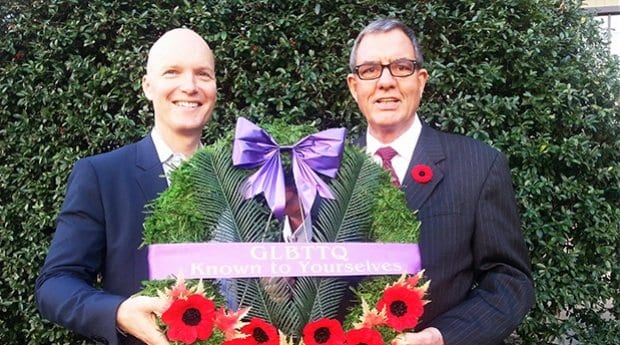For those who never had the chance to fall in love. For those who watched a lover die on the battlefield. For those who were silenced in their grief. Vancouver Councillor Tim Stevenson says that this Remembrance Day, when he lays a wreath in memory of gay soldiers who fought and died in the wars, he’ll be “giving voice to that which dared not speak its name.”
This may be the first time that gay soldiers are officially commemorated in Vancouver, “and it’s about time,” says Stevenson, who has been attending Remembrance Day ceremonies at the cenotaph here for 18 years, first as a member of the BC legislature and then as a city councillor. “I was seeing people laying wreaths for one group or another but none for LGBT soldiers. They were the silent ones.”
The idea to lay a wreath for gay soldiers started percolating after he read an obituary in The Vancouver Sun three years ago for a soldier who died at Juno Beach. The obituary, which is simply signed “Bob,” reads, “Fond memories of my pal Private Harry Ebdon, East Lancs Regt Killed in Action, Normandy July 16, 1944. Age 22 years.”
“I have no idea if this was from his gay lover, but I thought it was a good possibility that it wasn’t from a brother or a cousin or a friend,” Stevenson says. “It struck me how much he must have suffered all these years.”
After visiting Juno Beach a couple of summers ago and noting the monument to aboriginal soldiers, “I thought, ‘Why not?’” Stevenson says. “If, like any other segment of the population, 10 percent of the [more than 110,000 Canadians who died in the two world wars] were gay, it means many of these young men at 19, 20, 25 might’ve died before they could’ve had a lover or even come out. And, of course, some men might’ve met and fallen in love in the army and then witnessed their lovers blown to bits on the battlefields. Others might’ve left lovers right here in Canada.
“These guys, unlike girlfriends and wives, would never be recognized and could not openly weep or mourn,” Stevenson notes.
Homosexuality in the military was banned until 1992, when Corporal Derrick Dwyer took the military to court and won. Dwyer’s lawyer, Rob Hughes, recalls that his client was proud of serving and refused to quietly slink away when he was outed to his superior officers. “The soldiers in his unit were aware he was gay and had no problem,” says Hughes, who filed the suit in 1988, taking on the Justice Department. “This was a milestone because Derrick was the first person to launch a challenge.”
Before then, gay soldiers were at various times labelled “anti-social psychopaths” or “psychopathic personalities” with “abnormal sexuality” and discharged. In the 1950s, ’60s and ’70s era of McCarthyism and the Cold War in the United States, homosexuals in the Canadian military were deemed a threat to national security. They were stalked day and night to be rooted out, the thinking being that hiding what they were made gays easy targets for blackmail and therefore a risk.
Cameron Cathcart, chair of the Vancouver Remembrance Day Committee, says this is the first he knows of a wreath being laid for gay soldiers. This year, close to 55 wreaths are being laid in memory of those who gave their lives in conflict in the past 100 years. “Regardless of who they are, regardless of orientation, we treat every one of those wreaths in an equal way. It’s the honourable thing to do,” says Cathcart, who will lead the ceremonies at Vancouver’s Victory Square for the 12th year in a row.
Stevenson has invited Tim Richards, head of the Vancouver Pride Society, to join him in placing the wreath. Richards also believes that it’s important for society to recognize LGBT members who wouldn’t have been able to live authentically.
“Remembrance Day is another opportunity to reflect and pay tribute to all the men and women who served for our freedom,” says Richards, who recalls as a little boy visiting the cenotaph in Sheet Harbour, Nova Scotia, with his grandfather Malcolm Richards, a veteran of both world wars.
For Stevenson, the son of a Second World War veteran who grew up hearing stories about the war, laying this wreath is about the men who faced the horrors of war in the trenches of Belgium and France and for the gay soldiers and their lovers who suffered in silence.
Vancouver Cenotaph
Tues, Nov 11, 10:30am
150 W Hastings St

 Why you can trust Xtra
Why you can trust Xtra


